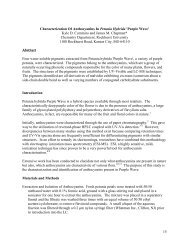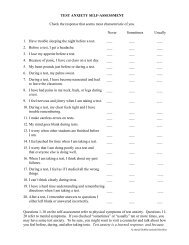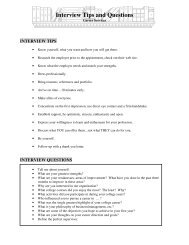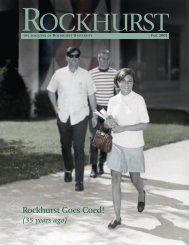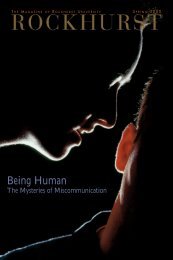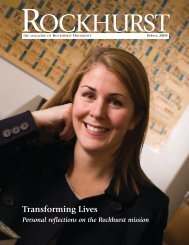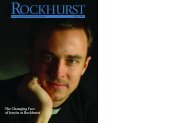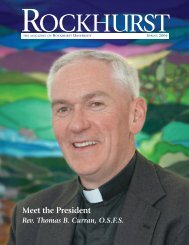in the Jesuit Tradition - Rockhurst University
in the Jesuit Tradition - Rockhurst University
in the Jesuit Tradition - Rockhurst University
You also want an ePaper? Increase the reach of your titles
YUMPU automatically turns print PDFs into web optimized ePapers that Google loves.
Photo courtesy of Smith-Lamar & Associates.delivered <strong>the</strong>ir own as well (Who could forgetLloyd Bentsen’s “Senator, you are no JackKennedy” crack to Dan Quayle <strong>in</strong> 1988?).In <strong>the</strong> past 25 years, presidents and <strong>the</strong>ircommunication staffs have made it a priority tocapitalize on television, particularly throughpublic address. Although reluctantly, Carter wasamong <strong>the</strong> first presidents to hire a staff whosecharge it was to concern <strong>the</strong>mselves primarilywith <strong>the</strong> media. He brought <strong>in</strong> a film directorfrom Hollywood to manipulate his image andenhance his leadership. Such a position is nowwidely accepted and promoted. Though hisspeechwriters would construct speechescompletely, Carter would scratch out revisionson <strong>the</strong> marg<strong>in</strong>s. On an archived draft of onespeech he wrote “make me sound morepresidential here” and o<strong>the</strong>r staff memorandaencourage <strong>the</strong> president to be “hard hitt<strong>in</strong>g”to show leadership qualities.Peggy Noonan, speechwriter for PresidentsReagan and George Bush, wrote <strong>in</strong> her bookWhat I Saw at <strong>the</strong> Revolution that for <strong>the</strong> firstyear <strong>in</strong> office all she really saw of Reagan was hisfoot. Her job was not to know <strong>the</strong> president butspeak with his voice and collaborate on leadership.President Reagan also drew from his act<strong>in</strong>gexperience <strong>in</strong> front of <strong>the</strong> camera to become<strong>the</strong> “great communicator.” Bill Cl<strong>in</strong>ton showedhow a president, despite be<strong>in</strong>g caught <strong>in</strong> lies bytelevision, could turn <strong>the</strong> tables and use <strong>the</strong>same medium to buildan image so strong thathis popularity actually<strong>in</strong>creased.Despite an apparenttelevision assault onpresidential leadership,<strong>the</strong> medium also serves avaluable purpose <strong>in</strong> timesof crisis. On Sept. 20,2001, an anxious andwounded nation turnedtoward George W. Bushfor leadership n<strong>in</strong>e daysafter terrorist attacks<strong>in</strong> New York City,Wash<strong>in</strong>gton, D.C., andrural Pennsylvania. Bush’swell-crafted speech transcended party l<strong>in</strong>es tounderscore shared values and ignite <strong>the</strong> passionsof a unified country. On that night, televisionbecame <strong>the</strong> s<strong>in</strong>gle-most significant reflector ofleadership; its presence was crucial to <strong>the</strong> earlystages of American heal<strong>in</strong>g. Millions watchedfrom home, taverns and restaurants. A NationalHockey League game between <strong>the</strong> New YorkRangers and Philadelphia Flyers was suspendedafter two periods when fans demanded to watch<strong>the</strong> president’s address on <strong>the</strong> arena’s video screen.Television became <strong>the</strong> channel through whichleader led follower, and served as <strong>the</strong> test for <strong>the</strong>president’s ability to rise to <strong>the</strong> occasion. Hepassed <strong>the</strong> test. In <strong>the</strong> clarity of <strong>the</strong> moment,television was an essential channel for a messagethat forced <strong>the</strong> president to strip away rhetoricaldebris and use his language to lead o<strong>the</strong>rs.Television will take us places we have yet toforesee and affect presidential leadership <strong>in</strong> wayswe cannot yet articulate. Its impact on <strong>the</strong> outcomeof <strong>the</strong> 2000 presidential election has calledfor legislation to restrict its freedom to shapevoters’ perceptions <strong>in</strong> <strong>the</strong> future. Despite<strong>the</strong> notion that leadership is under siegefrom television, fundamentalleadership pr<strong>in</strong>ciples may neverchange. Character. Commitment.Service. Courage. Thesepr<strong>in</strong>ciples can be spun <strong>in</strong> onlyone direction. Peter Bicak, Ph.D.ROCKHURST 20



